Search results
2 results found.
 MarkFord.net
MarkFord.net
The open-for-inspection half-way home for my writing…
2 results found.
Sebastian was flattered when Michael, his former protégé, asked him to critique the promotion he’d written. After all, Sebastian hadn’t written much copy in the 10 years that had passed since they worked together. And during that time, Michael had written a score of blockbusters. He was the man.
Nevertheless, Sebastian agreed to do it.
“It’s generally very good,” he wrote in his critique. “But I have one idea that you might want to consider…”
After sending it off, Sebastian worried. His suggestion would require Michael to spend hours reworking the lead. And he wasn’t sure that his idea was any better than what Michael had already written. He feared that Michael would be insulted.
Sebastian didn’t have to worry for very long. An hour later, Michael returned his email. “That was brilliant!” he wrote. “I don’t know how you do it! I’m going to get to it right away!”
Sebastian felt immense relief. Michael was in an entirely different mindset. He was focused on the work, on making it better. For him, it had nothing to do with feelings.
How to Get Better at What You Do Best
“If you accept your limitations you go beyond them.” – Brendan Behan
The greatest challenges we face in life are obstacles that reside inside of us. When it comes to mastering a skill, the greatest challenge is not the work and time involved in acquiring it but the desire to be a master before you become one.
Hubris – Aristotle’s term for excessive, blinding pride – is the fatal flaw that foiled many tragic heroes in literature, from Oedipus to King Lear to Captain Ahab. And in developing any complex skill, such as copywriting, hubris manifests itself in the same way. The copywriter believes – or desperately wants to believe (which is sometimes worse) – that his/her writing is above reproach.
This is equally true for musicians, tennis players, salsa dancers, sumo wrestlers, and skateboarders. Those who are willing to say “I can do better” do better. Those who say “I am the greatest” soon take a tumble.
What you want in your career is the confidence that follows accomplishment, not the pride that precedes a fall.
So that’s the first lesson: No matter how good you are at what you do, never tell yourself that you can’t get better and never believe you can’t learn from others, even those that cannot perform at the level you have attained.
Think about your strongest skill – the talent or capability that is most important to the achievement of your main goal. Now ask: “Am I willing to acknowledge that there are people in my universe who are better at this than I am?”
If you can accept the limitations of your strongest skill, there is no limit to how far you can develop it.
The Fire and the Funnel
Ego is the fire that fuels our ambitions. The ambition to master any skill is sparked by the heart’s imagination – seeing oneself at the top of the podium, lauded for one’s achievement, acknowledged for one’s value.
But when ambition becomes pride and pride becomes excessive, the skill seeker stops learning. He cannot learn because he believes he has nothing to learn. He refuses criticism. He defends his weakest efforts. He denies his failure – to others and to himself.
On fire with an exaggerated opinion of himself, he burns out.
Humility is the funnel that can prevent this. Humility set boundaries on pride and keeps the ego fire under control.
When I started actively training in Brazilian Jiu Jitsu (BJJ) at age 47, I wasn’t very good at it at all. I had always prided myself on being a good grappler and a scrappy fighter, but I found out very quickly that those old confidences could not sustain me. I got my ass handed to me by guys that were half my size.
I had a choice: Be humble or be proud.
Pride would have spurred me to announce that BJJ was a bullshit sport and quit, thus avoiding future humiliations on the mat. Humility would have let me accept the reality of my incompetence, thus allowing me to continue to practice and learn.
Happily, I chose to be humble. And since then, every time I’ve advanced through the belt rankings, from white to blue to purple to brown and to black, I’ve had to face the fact that there were many others – not just higher belts but lower belts, too – that were more skillful than I. Even today, getting beaten by a purple belt or a brown belt challenges my pride. And each time, I have to choose to accept the fact that others are better… because if I don’t, I cannot continue to improve.
Human beings are designed to get better through practice. Everything we ever learn to do – from walking to talking to writing concertos – gets better through practice. Practice makes our fingers move faster, our hearts beat stronger, our brains think smarter. What is it that Michael Jordan and Tiger Woods talk about when they talk about their careers? It’s not that they were gifted with extraordinary natural talent. It’s that they worked harder than their competitors.
Practice doesn’t make perfect. That’s a foolish idea. Practice makes better. And better is where all the enjoyment is in learning.
To become a better version of whatever you are good at now, you need the fuel of your ambition to drive you forward. But without the funnel of humility to restrain your pride, you will stop practicing. And when you stop practicing, you are out of the game.
This essay and others are available for syndication.
Contact Us for more information.
Book Recommendations for 2022
From Literary Hub’s “Best 48”

The Dawn of Everything
By David Graeber and David Wengrow
“Whether or not you’re a longtime fan of the late anarchist anthropologist David Graeber’s engagingly erudite examinations of social phenomena like debt or bullshit jobs (conveniently titled Debt and Bullshit Jobs), you will absolutely love The Dawn of Everything. Co-written with archeologist David Wengrow, DoE is a peripatetic survey of early humanity’s wide and varied attempts to organize itself, calling into question academic orthodoxies that so often treat human history as a straight narrative line that leads directly to late-stage, neoliberal capitalism. As if we didn’t make all this shit up and can’t make up some new, better shit.
“From the seasonally migratory communities of the Fertile Crescent to the egalitarian foragers of 10th-century California to the proto-cities of the ancient Ukrainian steppe, DoE is a probing look back at the ways in which people – just like us! – have tried to live together (spoiler alert: heavily policed, top-down hierarchies are not inevitable systems for human coexistence). DoE is a work of history, but also offers us a way forward: we are the ones who have imagined this world into being, and maybe we can imagine our way out.”

The Life of the Mind
By Christine Smallwood
“One of the purest pleasures I can experience while reading novels is also one of the rarest: when I read some detail – a character’s passing thought or observation, a way of relating one thing to another – that is deeply comprehensible, even familiar, despite the fact that I have never heard anyone say it out loud (or on the page) before. More plainly: I love it when characters in novels think the same terrible things that I think. This happens a lot in Smallwood’s precise debut The Life of the Mind, which is harrowing in some parts and hilarious in others, which is both deliciously cerebral and relentlessly physical, and which feels like a new kind of campus novel – one that’s actually honest.”
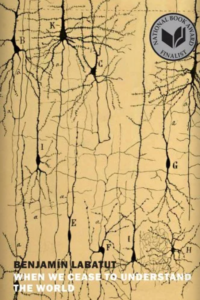
When We Cease to Understand the World
By Benjamin Labatut
“It is safe to say this might be the ‘word of mouth’ breakout success of the year (not often does a translated, genre-defying, contemporary NYRB title break into the New York Times 10 Best of the Year). Translated from the Spanish (Labatut is Chilean) by Adrian Nathan West, reading the first few paragraphs of When We Cease to Understand the Worldis like encountering a new intoxicant, with all its attendant thrills and shivers – and the uncertainty about where, exactly, things might lead.
“In what is essentially a fictionalized account of the real lives of a miscellany of 20th-century scientific giants (some famous, some less so), Labatut wades through the murky waters of human genius, finding there the darker implications of discovery, for society and scientist alike. Reading the inner lives of the likes of Fritz Haber, Werner Heisenberg, and Erwin Schrödinger – rendered by Labatut with the same kind of metaphorical heuristic so often employed to reveal truths about theoretical physics – one is left almost breathless by the grim consequences of all our endless wonder. There’s a reason this hybrid novel-biography has left its mark on nearly everyone who’s taken a taste.”
[ALSO A TOP-10 NYT BOOK]
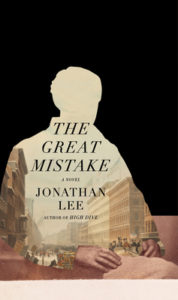
The Great Mistake
By Jonathan Lee
“In the opening pages of Lee’s latest novel, 83-year-old Andrew Haswell Green is murdered outside his home. It is 1903, in New York City. Lee then proceeds to explain to us – in lucid, luminous prose – exactly who Green was and why he met such an end. Which doesn’t really cover the pleasures of this novel, which are many: the lithe, surprising sentences, both dignified and playful; the finely wrought character portrait; the well-paced mystery; and the constant sense of discovery, as Lee keeps showing us vibrant new pockets of a world gone – and more broadly, unearths a true forgotten history, because if you don’t know (I didn’t), Green was a real person, a lawyer who is responsible for the creation of much of New York City as we know it, and yet has mostly faded from public memory. I, at least, will not forget him now.”

There’s No Such Thing as an Easy Job
By Kikuko Tsumura
“It seems like ‘burnout lit’ could be its own category these days, but trust me when I say that this is not that. Well, not exactly. Our unnamed narrator is a disaffected millennial, which for obvious reasons is a staple of the genre. But her anxiety and deadpan humor, when combined with the lens of modern Japanese culture and the increasing strangeness (and even supernaturalness) of the gigs – from spying on an author (riveting stuff, as you can imagine) to punching tickets at a haunted public park – make for a quietly engrossing story. Apparently this is the first time Tsumura’s been translated into English – an egregious oversight, and one that I hope is remedied soon.”
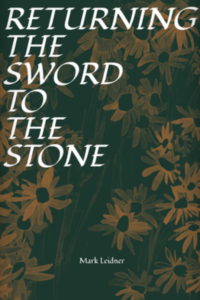
Returning the Sword to the Stone
By Mark Leidner
“Reading Mark Leidner will make you believe that humor is the most powerful poetic tool. Of course, almost no poets – almost no people – are as funny as Leidner, so you should probably just appreciate the poems in front of you instead of trying to make any grand proclamations about what other poems should be. This is how I felt when reading Returning the Sword to the Stone – grateful for a book so of itself, in which the humor doesn’t deflect truth, it refracts it. The poem ‘Youth is a Fugitive’ begins ‘that thinks it’s a hostage.’ I could go on, endlessly: this is the kind of book that urges relentless quotation, so I’ll restrain myself, except to say that I’m sorry to everyone to whom I texted every line of ‘I’m Running for President’ (the poetry equivalent of the best I Think You Should Leave sketches). I recommend Returning the Sword to the Stone to everyone, regardless of the size of their poetry library.”
From From GoodReads Choice Awards
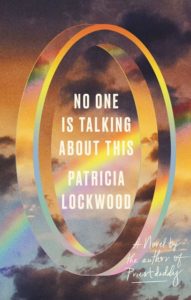
No One Is Talking About This
By Patricia Lockwood
“It’s another attention-grabbing mind-blower which toggles between irony and sincerity, sweetness and blight… Lockwood deftly captures a life lived predominantly online… This portrait of a disturbing world where the center will not hold is a tour de force that recalls Joan Didion’s portrait of the dissolute 1960s drug culture of Haight-Ashbury in her seminal essay, ‘Slouching Towards Bethlehem’… Lockwood is a master of sweeping, eminently quotable proclamations that fearlessly aim to encapsulate whole movements and eras… It’s a testament to her skills as a rare writer who can navigate both sleaze and cheese, jokey tweets and surprising earnestness, that we not only buy her character’s emotional epiphany but are moved by it… Of course, people will be talking about this meaty book, and about the questions Lockwood raises about what a human being is, what a brain is, and most important, what really matters.”
[ALSO A TOP-10 NYT BOOK]
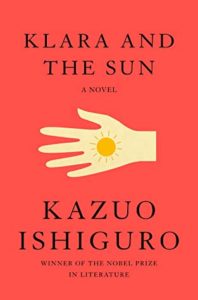
Klara and the Sun
By Kazuo Ishiguro
“Kara and the Sun confirms one’s suspicion that the contemporary novel’s truest inheritor of Nabokovian estrangement – not to mention its best and deepest Martian – is Ishiguro… Never Let Me Go wrung a profound parable out of such questions: the embodied suggestion of that novel is that a free, long, human life is, in the end, just an unfree, short, cloned life. Klara and the Sun continues this meditation, powerfully and affectingly. Ishiguro uses his inhuman, all too human narrators to gaze upon the theological heft of our lives, and to call its bluff… Ishiguro keeps his eye on the human connection.
“Only Ishiguro, I think, would insist on grounding this speculative narrative so deeply in the ordinary… Whether our postcards are read by anyone has become the searching doubt of Ishiguro’s recent novels, in which this master, so utterly unlike his peers, goes about creating his ordinary, strange, godless allegories.”
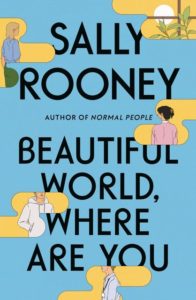
Best Fiction: Beautiful World, Where Are You
By Sally Rooney
“Irish author Sally Rooney wins this year’s Best Fiction award for her celebrated novel on the complexities of romance, sex, and friendship on our swiftly tilting planet. A kind of deep-focus love quadrangle story, the book clearly hit a nerve for readers. This is the second GCA nomination for Rooney – she came in second for her 2018 novel, Normal People.”
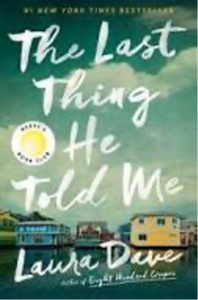
Best Mystery/Thriller: The Last Thing He Told Me
By Laura Dave
“Before Owen Michaels disappears, he smuggles a note to his beloved wife of one year: Protect her. Despite her confusion and fear, Hannah Hall knows exactly to whom the note refers – Owen’s sixteen-year-old daughter, Bailey. Bailey, who lost her mother tragically as a child. Bailey, who wants absolutely nothing to do with her new stepmother.
“As Hannah’s increasingly desperate calls to Owen go unanswered, as the FBI arrests Owen’s boss, as a US marshal and federal agents arrive at her Sausalito home unannounced, Hannah quickly realizes her husband isn’t who he said he was. And that Bailey just may hold the key to figuring out Owen’s true identity – and why he really disappeared.”
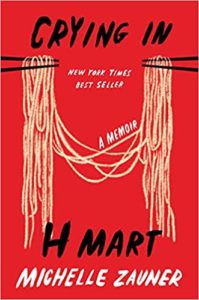
Best Memoir & Autobiography: Crying in H Mart
By Michelle Zauner
“An unflinching, powerful memoir about growing up Korean American, losing her mother, and forging her own identity.
“In this exquisite story of family, food, grief, and endurance, Michelle Zauner proves herself far more than a dazzling singer, songwriter, and guitarist… Vivacious and plainspoken, lyrical and honest, Zauner’s voice is as radiantly alive on the page as it is onstage. Rich with intimate anecdotes that will resonate widely, and complete with family photos, Crying in H Mart is a book to cherish, share, and reread.”
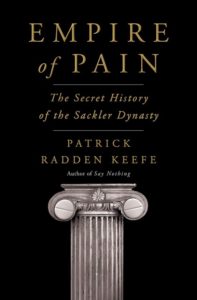
Best History/Biography: Empire of Pain
By Patrick Radden Keefe
“This year’s winner of the Goodreads Choice Award for History/Biography, Empire of Pain is an exhaustively researched profile of the Sackler family, the aristocratic American clan that made its fortune making and marketing the painkiller OxyContin. Patrick Radden Keefe is a master of the kind of narrative reporting style that brings novelistic intensity to rigorous nonfiction reporting. Keefe was also nominated for a GCA for his 2018 book, Say Nothing.”
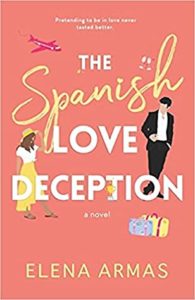
Best Debut: The Spanish Love Deception
By Elena Armas
“A wedding. A trip to Spain. The most infuriating man. And three days of pretending. Or in other words, a plan that will never work.
“Spanish author Elena Armas brings several new twists to a classic rom-com setup with this debut novel, which has already won a devoted following in the Goodreads community. Catalina Martin is taking her new American boyfriend to her sister’s wedding in a small Spanish town. Aaron Blackford is tall, handsome, and supremely aggravating. Alas, he’s not actually Catalina’s boyfriend. This is Armas’ first GCA win, naturally.”
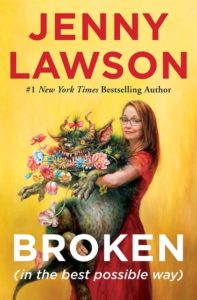
Best Humor: Broken
By Jenny Lawson
“As Jenny Lawson’s hundreds of thousands of fans know, she suffers from depression. In Broken, Jenny brings readers along on her mental and physical health journey, offering heartbreaking and hilarious anecdotes along the way… A treat for Jenny Lawson’s already existing fans, and destined to convert new ones, Broken is a beacon of hope and a wellspring of laughter when we all need it most.”
From the NYT’s Best 10
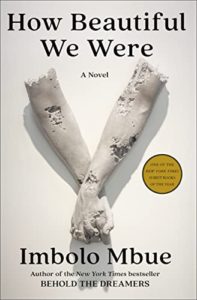
How Beautiful We Were
By Imbolo Mbue
“Following her 2016 debut, Behold the Dreamers, Mbue’s sweeping and quietly devastating second novel begins in 1980 in the fictional African village of Kosawa, where representatives from an American oil company have come to meet with the locals, whose children are dying because of the environmental havoc (fallow fields, poisoned water) wreaked by its drilling and pipelines. This decades-spanning fable of power and corruption turns out to be something much less clear-cut than the familiar David-and-Goliath tale of a sociopathic corporation and the lives it steamrolls. Through the eyes of Kosawa’s citizens young and old, Mbue constructs a nuanced exploration of self-interest, of what it means to want in the age of capitalism and colonialism – these machines of malicious, insatiable wanting.”
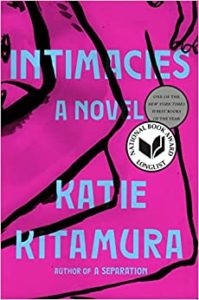
Intimacies
By Katie Kitamura
“In Kitamura’s fourth novel, an unnamed court translator in The Hague is tasked with intimately vanishing into the voices and stories of war criminals whom she alone can communicate with; falling meanwhile into a tumultuous entanglement with a man whose marriage may or may not be over for good. Kitamura’s sleek and spare prose elegantly breaks grammatical convention, mirroring the book’s concern with the bleeding lines between intimacies – especially between the sincere and the coercive. Like her previous novel, A Separation, Intimacies scrutinizes the knowability of those around us, not as an end in itself but as a lens on grand social issues from gentrification to colonialism to feminism. The path a life cuts through the world, this book seems to say, has its greatest significance in the effect it has on others.”
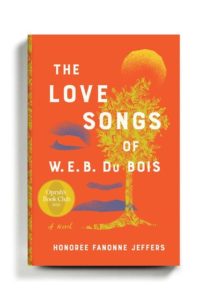
The Love Songs of W.E.B. Du Bois
By Honorée Fanonne Jeffers
“The Love Songs of W.E.B. Du Bois, the first novel by Jeffers, a celebrated poet, is many things at once: a moving coming-of-age saga, an examination of race and an excavation of American history. It cuts back and forth between the tale of Ailey Pearl Garfield, a Black girl growing up at the end of the 20th century, and the ‘songs’ of her ancestors, Native Americans and enslaved African Americans who lived through the formation of the United States. As their stories converge, Love Songs creates an unforgettable portrait of Black life that reveals how the past still reverberates today.”
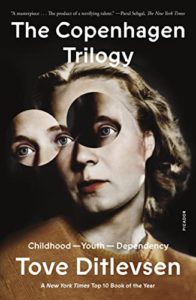
The Copenhagen Trilogy
By Tove Ditlevsen
“Ditlevsen’s gorgeous memoirs, first published in Denmark in the 1960s and ’70s and collected here in a single volume, detail her hardscrabble upbringing, career path and merciless addictions: a powerful account of the struggle to reconcile art and life. She joined the working ranks at 14, became a renowned poet by her early 20s, and found herself, after two failed marriages, wedded to a psychopathic doctor and hopelessly dependent on opioids by her 30s. Yet for all the dramatic twists of her life, these books together project a stunning clarity, humor and candidness, casting light not just on the world’s harsh realities but on the inexplicable impulses of our secret selves.”
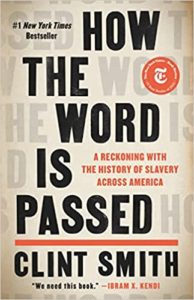
How the Word Is Passed
By Clint Smith
“For this timely and thought-provoking book, Smith, a poet and journalist, toured sites key to the history of slavery and its present-day legacy, including Thomas Jefferson’s Monticello; Angola, the Louisiana State Penitentiary; and a Confederate cemetery. Interspersing interviews with the tourists, guides, activists and local historians he meets along the way with close readings of scholarship and poignant personal reflection, Smith holds up a mirror to America’s fraught relationship with its past, capturing a potent mixture of good intentions, earnest corrective, willful ignorance and blatant distortion.”
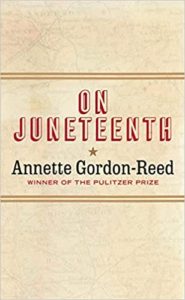
On Juneteenth
By Annette Gordon-Reed
“This book weaves together history and memoir into a short volume that is insightful, touching and courageous. Exploring the racial and social complexities of Texas, her home state, Gordon-Reed asks readers to step back from the current heated debates and take a more nuanced look at history and the surprises it can offer. Such a perspective comes easy to her because she was a part of history – the first Black child to integrate her East Texas school. On several occasions, she found herself shunned by whites and Blacks alike, learning at an early age that breaking the color line can be threatening to both races.”
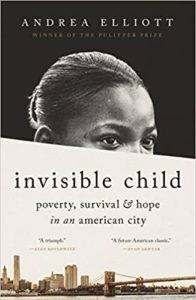
Invisible Child
By Andrea Elliott
“To expand on her acclaimed 2013 series for The Times about Dasani Coates, a homeless New York schoolgirl, and her family, Elliott spent years following her subjects in their daily lives, through shelters, schools, courtrooms and welfare offices. The book she has produced – intimately reported, elegantly written and suffused with the fierce love and savvy observations of Dasani and her mother – is a searing account of one family’s struggle with poverty, homelessness and addiction in a city and country that have failed to address these issues with efficacy or compassion.”
From Esquire’s Top 50
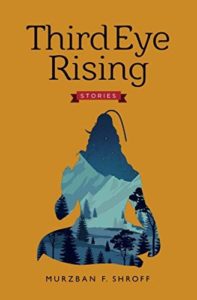
Third Eye Rising
By Murzban F. Shroff
“In these warm and wise parables of an ever-changing India, Shroff explores the tension between spiritual faith and modern life. In the harrowing title story, a dowry-less bride is forced to perform an agonizing ritual by her sadistic in-laws. Another unforgettable story invites us into the mind of a sacred cow, who narrates a confrontation between patrons at her temple. Each richly imagined story rings out with soulful truths about the collision between time-honored traditions and twenty-first century values, making for a stirring collection about where the past and present collide.”
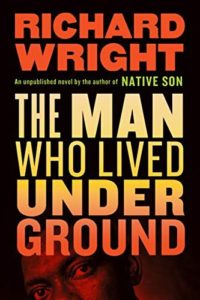
The Man Who Lived Underground
By Richard Wright
“What if you could look at life from outside of life? What would you see? That’s the provocative question posed in this previously unpublished novel from one of the twentieth century’s greatest writers, wherein a Black man named Fred Daniels is apprehended by the police, brutally tortured, and forced to sign a confession for a violent crime he did not commit. To escape his captors, Daniels flees into the city’s underground sewers, where he transforms into someone else entirely. Beneath an unfair world, Daniels tunnels into the basements of local establishments, leading him to startling truths about morality, injustice, and what matters most when the world’s systems are stripped away. Though the novel was written in the 1940s, its visceral vision of crime and punishment continues to hold modern resonance.”
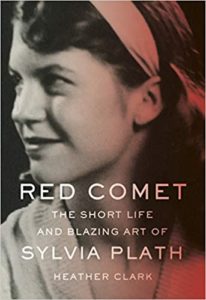
Red Comet
By Heather Clark
“It’s daring to undertake a new biography of Plath, whose life, and death by suicide at 30 in 1963, have been thoroughly picked over by scholars. Yet this meticulously researched and, at more than 1,000 pages, unexpectedly riveting portrait is a monumental achievement. Determined to rescue the poet from posthumous caricature as a doomed madwoman and ‘reposition her as one of the most important American writers of the 20th century,’ Clark, a professor of poetry in England, delivers a transporting account of a rare literary talent and the familial and intellectual milieu that both thwarted and encouraged her, enlivened throughout by quotations from Plath’s letters, diaries, poetry and prose.”
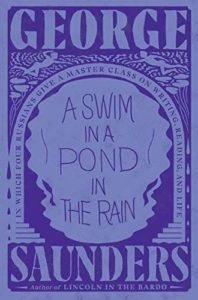
A Swim in a Pond in the Rain
By George Saunders
“‘The part of the mind that reads a story is also the part that reads the world,’ George Saunders writes in A Swim in a Pond in the Rain. It’s perhaps the truest distillation of Saunders’ visionary life and work, encapsulating the characteristic generosity and humanity of his artistic outlook. Saunders has spent over two decades teaching creative writing in Syracuse University’s MFA program, where his most beloved class explores the 19th-century Russian short story in translation. In A Swim in a Pond in the Rain, Saunders has distilled decades of coursework into a lively and profound master class, exploring the mechanics of fiction through seven memorable stories by Chekhov, Tolstoy, Turgenev, and Gogol. In these warm, sublimely specific essays, Saunders’ astounding powers of analysis come into full view, as does his gift for linking art with life. By becoming better readers, Saunders argues, we can become better citizens of the world.”
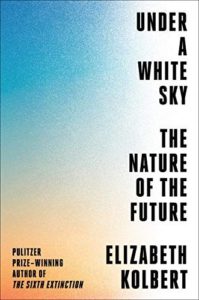
Under a White Sky
By Elizabeth Kolbert
“The Pulitzer Prize-winning author of The Sixth Extinction returns with another sobering look at our Anthropocene Epoch, this time centered not on the countless calamities ahead, but on the trailblazing efforts of scientists to turn back the doomsday clock. Kolbert describes the subjects of Under a White Sky as ‘people trying to solve problems created by people trying to solve problems’; she turns her lens to human interventions in nature, like the storied redirection of the Chicago River, and to the pressing need for further intervention to correct our folly. Traveling everywhere from the Great Lakes to the Great Barrier Reef, she chronicles her encounters with scientists, who are pioneering cutting-edge technologies to turn carbon emissions to stone and shoot diamonds in the stratosphere. Heralded by everyone from Barack Obama to Al Gore, Kolbert’s urgent, deeply researched text asks if our ingenuity can outrun our hubris.”
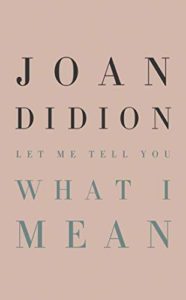
Let Me Tell You What I Mean
By Joan Didion
“From a titan of American letters comes a compendium of twelve early pieces, never before anthologized together, which find everyone from Martha Stewart to Ernest Hemingway in Didion’s crosshairs. Each essay showcases Didion at her very best, spotlighting her incisive reporting, her steely narrative gaze, and her commanding gifts as a prose stylist. Anthologized together in this compact volume, these peerless essays remind us just why Didion looms so large in the pantheon of American literature.”
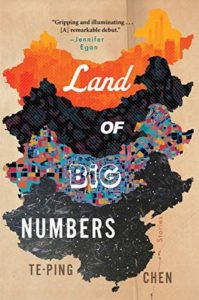
Land of Big Numbers
By Te-Ping Chen
“Chen’s remarkable debut collection of stories unfolds across the modern Chinese diaspora, pinballing between acutely observed realism and tragicomic magical realism. In one story, a man becomes addicted to chasing the highs and lows of the volatile Chinese stock market; in another, a group of commuters remain trapped in a subway station for months on end, awaiting permission to leave. Each haunting, exquisitely crafted story poses powerful questions about freedom, disillusion, and cultural thought, firmly establishing Chen as an emerging visionary to watch.”
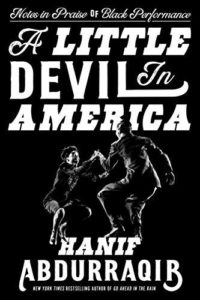
A Little Devil in America
By Hanif Abdurraqib
“The celebrated author of Go Ahead in the Rain returns with a far-reaching collection of twenty essays, each one a remarkable synthesis of criticism, autobiography, and cultural study about Black performance in America. Abdurraqib meditates on performances past and present, spotlighting everything from Soul Train to Whitney Houston, Josephine Baker to the Wu-Tang Clan. He illuminates what’s personal and political about Black performance, weaving a jubilant love letter to the resilient entertainers who’ve graced stages both big and small.”
In addition to those I intend to read the following seven:
Third Book’s a Charm
Among contemporary, nonfiction writers, two of my very favorites are Yuval Noah Harrari and Steven Pinker. I audio-read their books whenever I’m in my car. Because their ideas are so good and plentiful, I am happy to read the same books over and over again. But when a new one comes up, I’ll read that, too. For example:
Yuval Noah Harrari
* I read Sapiens: A Brief History of Humankind
* I’m reading 21 Lessons for the 21st Century
* I’m will read Homo Deus: A Brief History of Tomorrow
Steven Pinker
* I read Rationality
* I’m reading Enlightenment Now
* I will read The Better Angels of Our Nature
Classics That I Missed
Because of all those early years I spent not reading, I reached adulthood nearly illiterate in terms of the “classic” authors and books. I try to make up for that by reading five or six of the biggies each year. This year’s selections include:
* To the Lighthouse by Virginia Woolf
* Ulysses by James Joyce
* The Sound and the Fury by William Faulkner
* Invisible Man by Ralph Ellison
* The Magic Mountain by Thomas Mann